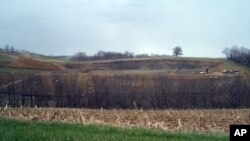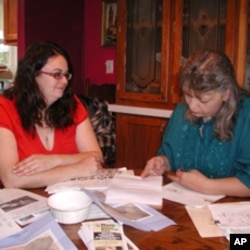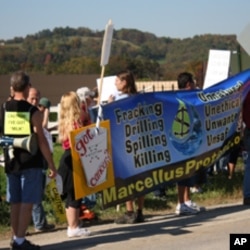There is a lot of construction near Janet McIntyre's home in southwestern Pennsylvania. It's not new houses, but new industry: 10 gas wells, a compressor station and multiple drilling-waste ponds.
The state sits atop the nation’s largest deposit of natural gas known as the Marcellus Shale. What concerns McIntyre and her neighbors is an extraction process called hydraulic fracturing or "fracking." It combines deep horizontal and vertical drilling with enormous amounts of water, chemicals and sand.
Water troubles
McIntyre never worried about her water before. When she looks out on the wooded rural landscape from her front porch she talks about her well water liked a cherished lost friend. “We never ran out of water. We never had a problem with our water. It was cold coming out of the spigot just as if you went to a regular spring and got it. It was gorgeous water.”
Then one night McIntyre got sick. She had a bad headache and vomited. When her husband Fred went for a glass of water and turned on the spigot, it spewed out smelly foam.
“He hollers back, I think I know why we’re sick," she remembers. "There’s something wrong with our water.”
The McIntyres stopped drinking the well water.
Neighbor Kim McEvoy says her water turned black and she got sick too. “My fingernails were growing downward. My hair was falling out. I’d get dizzy.”
McEvoy and McIntyre complained to the gas company and the Pennsylvania Department of Environmental Protection.
The gas company gave them bottled water.
'Unsafe levels'
Initial tests of McIntyre's well water showed unsafe levels of toluene, a volatile and toxic petrochemical that causes nausea and headaches. McEvoy's well water had arsenic. Now, months later, new company tests say the water is safe to drink, although trace chemicals are still present.
Bottled water deliveries end next month.
The two households get their water from private wells, like three million others who live in rural Pennsylvania. The state has no rules on the location, design, testing or treatment of private drinking-water wells. That means contamination could come from other sources like poor well construction or failing septic systems, or gas migrating naturally from adjacent rock or leaking from abandoned mines.
But McEvoy thinks the gas companies are responsible too.
Over the past year she and McIntyre have called on township officials, testified at local hearings, and joined in protests. They want the drilling stopped.
Fracking chemicals in water
Fracking is banned in and around the city of Pittsburgh, and it’s under a moratorium in the nearby states of New York and Maryland until health and environmental risks are assessed.
The battle continues on Capitol Hill. Ohio lawmaker Bob Gibbs, whose state stands to gain jobs and revenue from gas development, backs the industry. In a recent house hearing, Gibbs asked Pennsylvania’s Department of Environmental Protection director Michael Krancer about the state’s safety record.
Krancer testified that fracking has never caused a groundwater contamination problem. “Fracking simply doesn’t do that. And there’s still not a documented case,” he said.
Gibbs got the same reply from experts in Ohio and Oklahoma.
But a new draft report released by the U.S. Environmental Protection Agency disputes those claims. Preliminary results of the three-year federal study in Pavillion, Wyoming, show chemicals associated with hydraulic fracturing gas wells in the area are turning up in the ground water.
The EPA findings add weight to the complaints of Pennsylvania landowners like Kim McEvoy and Janet McIntyre.
Closer look
Steve Hvozdovich, Marcellus Shale Campaign director with the Pennsylvania Chapter of Clean Water Action, advises a closer look at the industry. He says in 2010 alone, the Pennsylvania Department of Environmental Protection cited gas drillers 1,200 times for operational violations.
“Some of those are generic administrative stuff like paperwork. But the other half are for serious things that can lead to environmental problems. We’re talking about improper construction of frack pits. We’re talking about improper disposal of wastewater. We’re talking about improper cement casing jobs which are designed to protect our groundwater aquifers. We’re talking about venting of hazardous gas. Now those things to me signify that we have some serious issues going on.”
All this worries University of Pittsburgh School of Public Health professor Bernard Goldstein. He says fracking has already been linked to higher levels of bromide in the water, which is highly toxic.
He believes fracking might also release more radioactivity and arsenic into groundwater. He advocates for baseline studies before drilling and for taking a more comprehensive look at the Marcellus Shale activity.
“We know too little. We’re running ahead as if we’re absolutely sure no problem is going to occur without dong the necessary studies. The gas isn’t going away. The question I have is why are we rushing into this?”
Eyes now are focused on the U.S. Environmental Protection Agency. Beyond its Wyoming report, the EPA is completing a more comprehensive study, requested by Congress in 2010, of the impact hydraulic fracturing might be having on local water supplies. Initial findings are due in 2012.
In the meantime, Janet McIntyre plans to continue her fight to halt the gas drilling. “I want my water back. I want my air back. They took it from me and I want it back.”






